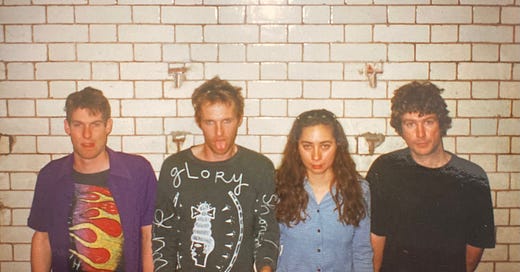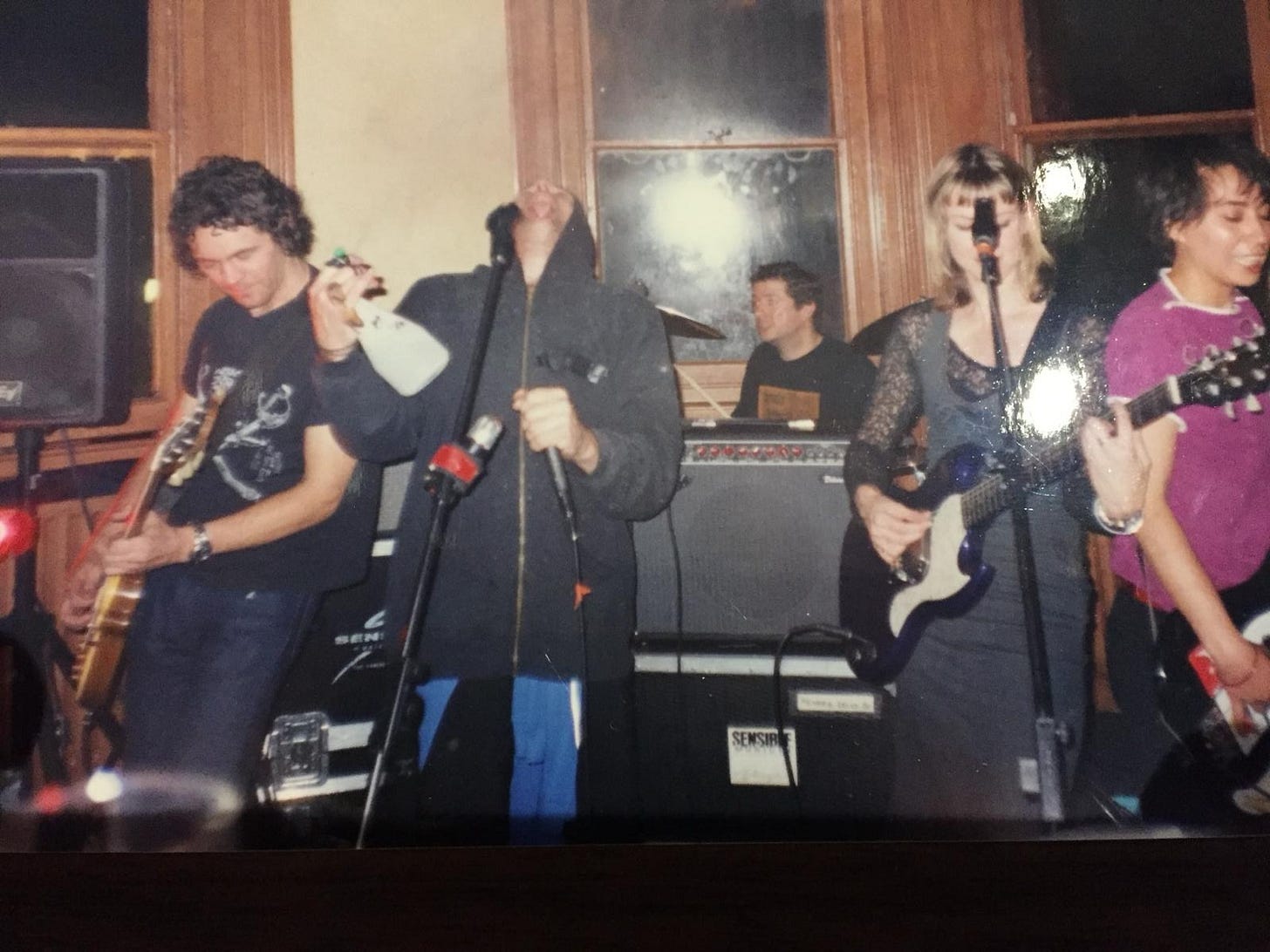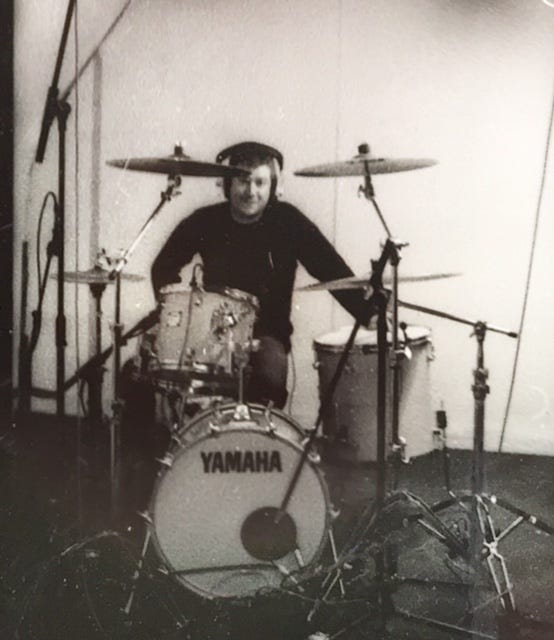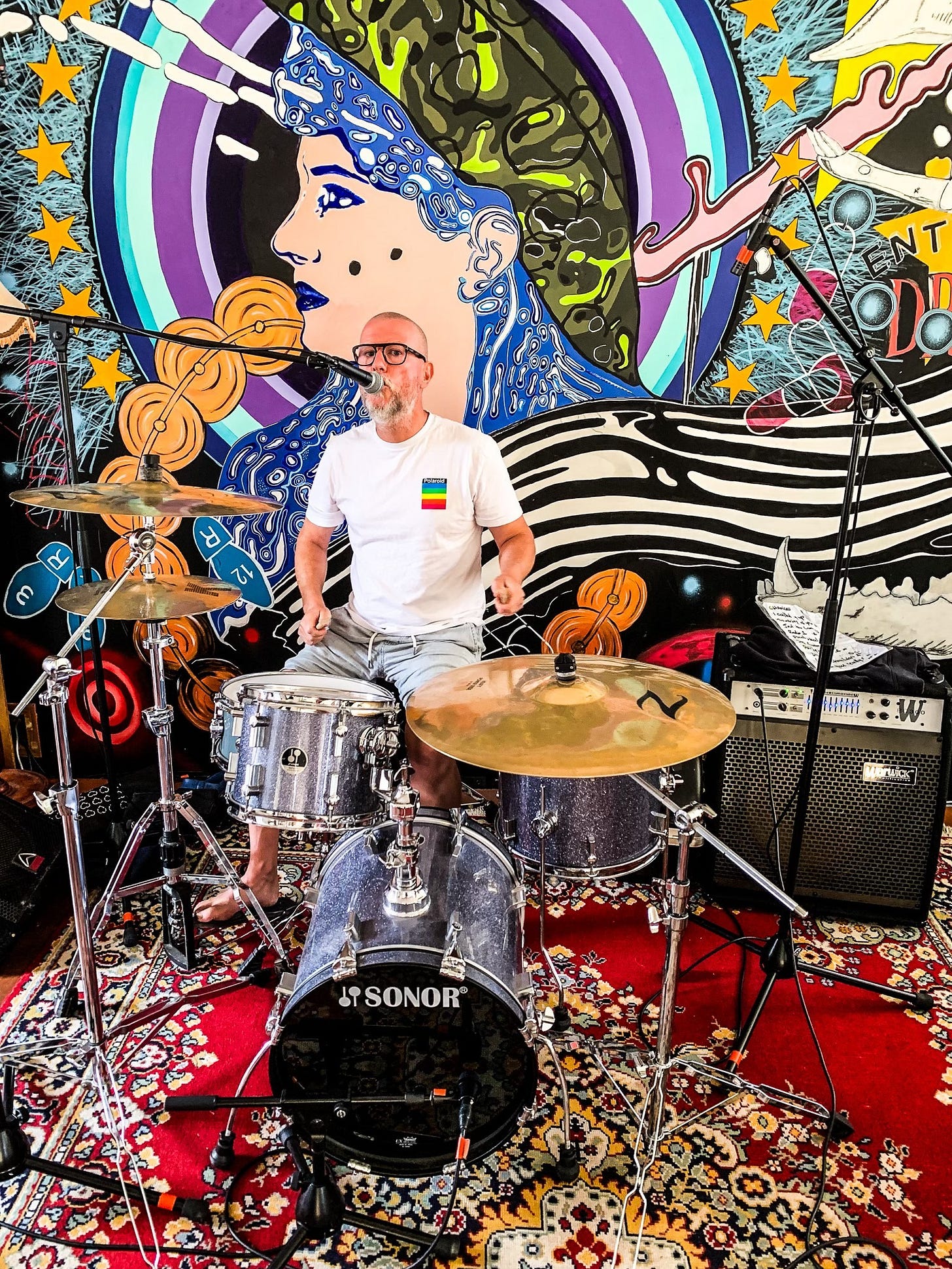A story about friends and music - the weaving threads tie us all together.
Album release day - they happen all the time, of course, but for the artist, the person releasing the music, it’s a big day. It marks the end of a lot of work and planning and sometimes, if you are lucky and have the right support behind you, it can mean the beginning of a lot of work - shows, tours, interviews.
More often than not, though, now, it means releasing an album and hoping like hell someone listens to it at least. You must also figure out ways to get it into people’s ears.
For all the twists and turns of living a life in music, the ole rollercoaster and the nothing-guaranteed scenarios - THE best thing to come out of this is the people I have met. The lifelong friends I’ve made - true friendships - I can’t imagine my life without these people in my orbit. Of course, some have spun off to other celestial places, but I still feel that love, think of them a lot, and feel gratitude for the time spent with them.
Playing music with others is a powerful thing.
I met Craig Horne, Barbara Morgan and Kevin Moody in London around 1995.
The Mockers had split up in London and Andrew Fagan returned to New Zealand. (I’d formed the Julie Dolphin in London with ex-Mockers Brett Adams and Geoff Hayden; I wasn’t about to give Fagan his band back!).
Andrew returned to the UK in 1995 with a new band he called Lig -with drummer Craig Horne, Barbara Morgan on bass and guitarist Kevin Moody
Lig in London - Kevin Moody, Andrew Fagan, Barbara Morgan, Craig Horne.
Lig and The Julie Dolphin/Boom Boom Mancini played a couple of shows together on the same bill. When Kevin Moody left London to return to New Zealand, he had possibly 100 leaving parties - Brett and I joined Lig to play at one of these:
In an upstairs bar somewhere in Camden? Fagan has his spray bottle - don’t worry.
Craig and Barb lived near us in Peckham, and we used to see each other often. I remember laughing a lot, and I remember Craig inviting us to dinner a couple of times and cooking for Brett and me (Barb was out at work cooking for others). The evening often ended up with us sitting on the couch while Craig showed us his ballroom dancing moves. Hilarious. (Sorry, Craig).
A couple of years ago, Barbara messaged me and sent me one of the songs Craig and she had recorded. It was called Radio 1. The guitar chug and sticky melody got me. It reminded me of the guitar parts I used to play in The Julie Dolphin - I messaged back and flippantly said, “Ooh, I should play guitar! ” And somehow, that has happened. I’m a guitarist in the band Haiku Redo. I chug.
Haiku Redo is the VW Kombi vehicle for Craig Horne’s super hooky, stickable pop songs. When I’m listening to or playing these songs, I often think - after all this time, how did I not know Craig was such a good songwriter - hiding his talents behind his other talents?
And because there isn’t a lot of written history out there for people to reference, I figured others would be asking the same thing: What the? How the? Who the? How did this album come about so perfectly formed and prufeshnal?
So, I asked Craig a few questions. He kindly obliged in his Craig-like way.
But first, please remember to check out Haiku Redo's new album, Disco Summer, out in the world today. It’s a cracker.
The Interview:
Who the? What the? How the?
Craig, you are an excellent drummer, singer, guitarist, and songwriter. How did it all start for you musically? Where did you spend your formative years and childhood? Tell me about your musical friends and your background.
No one in my family was really musical.
I went to Pakuranga College and met a talented musician, Hamish Sutherland. He played drums like a seasoned performer at the age of 13, and as soon as I heard how drums could sound, I was in.
Buying my first proper drum kit from Frank Gibson Jr at Drum City was a special moment.
We started a band called Piney Woods, and with the best musician at school in the band, it was a good start.
We had some competition with another band called The Incrowd. They went on to become Garageland. It showed me that songwriting trumps everything.
I have witnessed first-hand your dancing abilities… tell us a bit about that. When and how did that start?
It was the summer of 1977, a disco summer if you will. I was 9 or 10, and everyone was learning the Brooklyn hustle. It was the first indication that I had some groove in me. I seem to find that moving my body in time to a catchy beat was pretty standard, whereas other people looked odd and uncomfortable. Boys that could shake in time were in hot demand, and pretty soon I was swept up in the competitive ballroom dancing scene. Boy, what an education that was!! From hardly even talking to girls, I was surrounded by them, holding them very close.
I did fairly well, but by the time I hit 18, rock n’ roll came calling.
I met you, Barb, and Kevin in London and didn't know much about your past lives as musicians. How did you all meet and start playing with Andrew Fagan in Auckland?
Kevin worked at Revolver Studios and was helping record Andrew’s album Blisters.
Andrew was looking for a band to tour with, and as Kevin played some bits on the album, he was asked to join permanently. My mate, who lived on Waiheke at the same time as Andrew, recommended me to Andrew. I auditioned and eventually got the call. I was very excited.
Barbara joined a bit later in the piece.
Dark Lig. London winter Lig.
How long did you play around New Zealand in Lig before you came over to the UK - did you do a lot of touring around Aotearoa?
We toured the country about three times with Andrew Fagan. The sort of tours where you played almost every night for nearly a month. Travelling by night, arriving in town to set up at the local record shop on the Main Street, and then reset up at the gig at night. I loved it, but it would kill me now!
What year did you all arrive in London, and was it with the express purpose of playing with Andrew Fagan in Lig?
In 1995, Andrew managed to get a UK-based record company to release his music. He announced he was going over to support this exciting development. He asked if anyone wanted to join him, and Kev and I were the only idiots who did.
Tom Davidson and Ian Williamson had proper life commitments, whereas Kev and I were a bit younger and more foolish.
So when we arrived in London, we needed a bass player. Reay Grant, who was already there, immediately hooked us up with Barbara Morgan, who had arrived in London a couple of years previously.
We gave her two songs to learn for the audition, and she learnt the whole album and blew us all away. This line-up was the first to go under the name of Lig.
Do you have any favourite memories of London, playing music, and otherwise?
Playing in a band around London in the 1990s was the best! So many venues, so many bands, so many people just like us moving to London to try to make an impression. London was where it could all happen. People took notice. The next big thing could be playing at the Dublin Castle on a Thursday night and record companies didn’t want to miss out.
I remember going to see your band Dianne, Boom Boom Mancini playing at the prestigious 100 Club on Oxford Street. Sharing the same stage where legends like the Sex Pistols had played similar shows in years gone by. I have a favourite photo of Barbara standing next to Frank Black of the Pixies, who just happened to be in attendance. That’s how it was.
Is this your first ever project where you have written all the songs, etc.? (You may have answered this above.)
Yes.
If so, why did it take so long, and how did you arrive fully formed as a songwriter (if not you have already answered this!)
I have always written little pop songs on my acoustic guitar. It always surprised me when a friend I hadn’t seen for years would remind me of them and even start singing them. I had forgotten them myself but they had stuck in their minds for years. It got me thinking, they must be catchy!
Hanging with some of the best songwriters around and I mean radio played songwriters, number-one hit songwriters, platinum record songwriters, I think I never really felt in the same league. So I never tried.
Two things have changed. Firstly, age has made me care less about being in the same league and more about just trying.
Secondly, technology has allowed me to sit in my garage and create recordings that I couldn’t have done in my youth. The tools I have at my fingertips now were available to only a few people who were deemed to have reached a standard where these resources could be properly utilised.
I am nowhere near “fully formed” but really enjoy partially forming some little melody into some form of a song.
In your mind or ears - what makes a song great, and who would you say your biggest musical loves/influences are
You recently played us a song by Jason Isbell. We were standing in the hallway of our hotel room. Halfway in, tears were starting to well up, and we all started to laugh in an attempt to conceal our emotions, but this guy had written a song that in a couple of verses had changed our collective mood. This was a sad song, but if you can change people’s moods with melody and lyrics, then you’ve gone a long way to writing a great song.
Robert Smith of The Cure is really good at this. I must be influenced by him because I have been listening to his happy/sad songs for decades.
What are your hopes for this album release?
I would like to be surprised by someone, years later, who has one of my songs stuck in their head.
…………………………………………………………………………………………………………………………………………………………………………………
Tell me what you think about the Haiku Redo album - Disco Summer. Go on.
Thanks for reading, and thank you so much for subscribing. To those people who have taken out paid subscriptions - THANK YOU SO MUCHHHHHH for the encouragement - I didn’t expect that, but I like it a lot.
xxxx










I knew they were old friends from London, I really enjoyed hearing the details. Those ties run deep!! ❤️
What a great read. It’s what life is all about. Lugging black boxes around taking the piss out of each other. Ha!